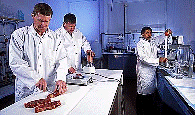United States Department of Agriculture: Agricultural Research Service, Lincoln, Nebraska

Roman L. Hruska U.S. Meat Animal Research Center: Reports
Date of this Version
1985
Document Type
Article
Abstract
Gonadal steroids mediate many responses throughout the body, many of which may have economic considerations. Antibodies made against steroids by active immunization have provided unique tools to begin to identify steroid target tissues and understand some of the body responses to gonadal steroids. Immunization of farm animals against steroids may potentiate their effects upon target tissues resulting in increased ovulation rate (androgens) and increased feed efficiency and rate of gain (estrogens).
A major secretion function of the ovary involves the release of sex steroids which have' multiple effects upon the body. Follicles release estrogen, which prepares the animal for breeding. After ovulation, the follicle develops into a corpus luteum that secretes progesterone and enables the pregnancy to be maintained. Beyond these general concepts, our knowledge of sex steroidal effects upon the body are limited. Only recently have ovarian androgens (primarily a male gonadal secretion) been identified as having a possible role in follicular maturation. Estrogenic effects upon growth are well acknowledged and utilized to the advantage of cattle feeders, but actual mechanisms involved are unknown. The purpose of these studies were to (1) identify the reproductive effects of active immunization against androstenedione and (2) evaluate the mechanisms of antibody-steroid effects with active immunization against estradiol in feedlot heifers.


Comments
Published in Beef Research Program Progress Report (1985) No. 2: 55